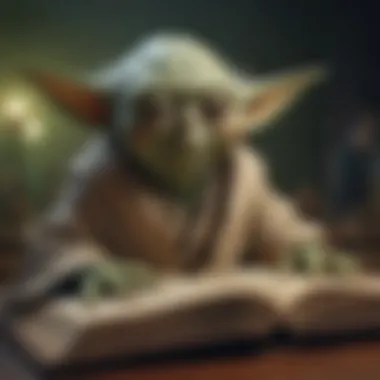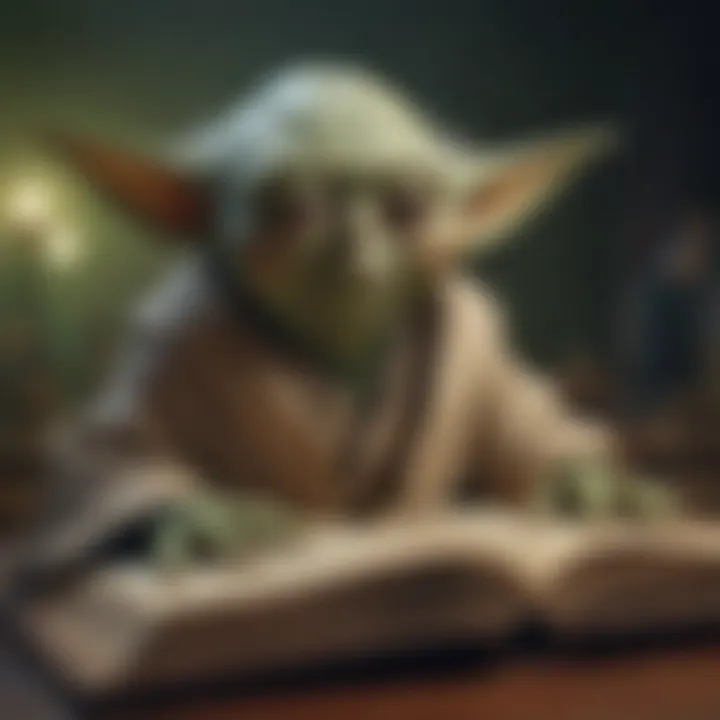Yoda's Wisdom: Insights and Themes in Literature


Intro
Yoda, a character synonymous with wisdom in the Star Wars universe, offers more than just advice for Jedi training. His words echo with profound philosophical insights that resonate through various life aspects, both personal and professional. This exploration aims to decode the layers of Yoda's wisdom as depicted in literature, guiding students, educators, entrepreneurs, and learners alike. By immersing ourselves in his lessons, we can draw practical applications that enhance our lives in contemporary society.
Key Lessons from the Book
Yoda's teachings often contain nuggets of wisdom that are simple yet incredibly impactful. Here’s a look at some of the vital lessons that resonate deeply within his guidance:
Lesson Overview
- The Power of Choice - Yoda frequently emphasizes that choices shape our destinies. He teaches that every decision, however small, can have significant consequences.
- Embracing the Present - Living in the moment is crucial. Yoda’s lessons remind us to focus on the now rather than dwelling on the past or stressing about the future.
- The Value of Patience - Many lessons underline the importance of patience and waiting for the right moment before taking action.
- Facing Fear - Yoda often urges characters to acknowledge and confront their fears, suggesting that overcoming them is essential for growth.
Practical Applications
- Decision-Making
Reflect on choices; consider how each could impact your life path. - Mindfulness Practice
Cultivate meditation or mindfulness techniques to enhance your ability to stay grounded in the present. - Developing Patience
Incorporate waiting periods in your decision-making processes to avoid impulsive choices. - Fear Management
Create strategies to confront and manage fears, allowing for personal growth.
"Do or do not, there is no try." – Yoda
This quote encapsulates the essence of commitment and the importance of fully engaging in the choices we make. It serves as a reminder that half-hearted attempts yield minimal results.
Author Insights
Though Yoda is a fictional character, the philosophical insights attributed to him reflect various real-life influences, including Eastern philosophies and classic literature. Writers and creators of the Star Wars franchise have integrated these principles into his character to offer universal truths.
Author Background
The character Yoda was created by George Lucas, who infused elements from a variety of philosophical, mythological, and psychological traditions into the Star Wars narrative. Yoda’s uniqueness stems from his portrayal as a wise mentor and teacher, embodying traits such as humility, resilience, and deep understanding.
Key Themes Explored
- Mentorship and its Impact - Yoda represents what a mentor should be, guiding learners in their journey.
- Cyclic Nature of Life - His lessons often reflect on the cycles of success and failure, teaching acceptance and transformation.
- Wisdom through Experience - Yoda’s age signifies the wisdom gained through years, highlighting the necessity of life experiences for gaining insight.
As we navigate our lives, incorporating Yoda's philosophical insights can lessen the weight of our struggles and enrich our understanding of our journeys.
Yoda: A Character of Depth
Yoda's character stands as a testament to depth and complexity within the star-studded realm of literature, particularly in the Star Wars saga. This iconic figure embodies wisdom, strength, and a unique perspective on existence that resonates with audiences across generations. Much more than a mere puppet or CGI creation, Yoda represents a philosophical archetype, illustrating the importance of introspection and mindful living. His lineage, teachings, and pivotal role in the narrative are significant as they impart deep insights into human nature and the struggles we face.
The figure of Yoda serves as a catalyst for growth, urging characters—and by extension, viewers—to contemplate their own journeys. In this way, he speaks directly to educators, students, and professionals about resilience, adaptability, and ethical decision-making. By delving into Yoda's essence, readers gain a richer understanding of not just his character but also the thematic undercurrents that pervade his teachings.
The Origins of Yoda
Yoda, whose origins can be traced back to the creative minds of George Lucas and his collaborators, first appeared in The Empire Strikes Back in 1980. He was envisioned as a wise Jedi Master, steering Luke Skywalker towards enlightenment. Interestingly, Yoda's physical appearance—small in stature but immense in wisdom—reflects the notion that true strength often comes in unexpected forms. This design invites audiences to reconsider their assumptions about capability and knowledge.
In shaping Yoda’s origins, the creators drew from various influences, including Eastern philosophies and mythological archetypes. This blend infuses his character with a tapestry of teachings that span cultural divides. The character's mysterious species and homeworld further add layers to his identity, compelling fans to delve into theories about the Jedi Order's history.
Yoda’s Role in the Star Wars Narrative
Within the Star Wars narrative, Yoda serves multiple functions. He is a mentor, guiding protagonists through their internal and external conflicts. Through his interactions, especially with figures like Luke Skywalker and even Anakin Skywalker, Yoda often embodies the moral compass and intellectual catalyst for the story’s unfolding drama.
His wisdom often juxtaposes the youthful impulsiveness of the young Jedi, underscoring essential themes of patience and growth. As a master of the Force, Yoda teaches that power is not solely about strength but is intrinsically linked to understanding and humility. His famous line, "Do or do not, there is no try," encapsulates a philosophy that encourages commitment over hesitation—an effective lesson for entrepreneurs and learners alike.
"Your quotes teach us that actions define us, not intentions."
Yoda's presence in vital encounters underscores critical moments of change, demonstrating how insight from an elder figure can shape an individual's destiny. He also balances the narrative's darker themes by representing hope and knowledge, suggesting that wisdom can light the path even in the face of overwhelming darkness.


In summary, Yoda, with his rich origins and significant role, embodies a wealth of themes that resonate with readers and viewers, offering life lessons that echo beyond fictional boundaries. His character is not merely a guide in a galaxy far, far away; he is a mirror reflecting our struggles and aspirations, urging us to look inward and find strength.
The Philosophical Underpinnings of Yoda's Teachings
Yoda's wisdom extends far beyond catchphrases. At the core of his teachings lies a rich tapestry of philosophical insights that resonate with diverse audiences, including students, educators, entrepreneurs, and lifelong learners. His thoughts on wisdom, morality, and the emotional complexities of fear and conflict create a framework that offers valuable lessons applicable in both personal and professional settings.
Understanding these philosophical underpinnings not only provides a deeper appreciation of Yoda's character but also invites reflection on how such insights can be used to navigate the complexities of modern life.
Wisdom and Knowledge
When it comes to knowledge, Yoda often emphasizes the significance of understanding one’s self first. His famous line, "You must unlearn what you have learned," underlines the idea that past experiences and preconceived notions can often cloud true wisdom. The journey to wisdom starts from a place of humility; admitting one does not know everything is a crucial step.
For instance, in the context of education, students who approach learning with an open mind, ready to challenge their assumptions, are more likely to gain profound insights. This stands true whether they are diving into ancient philosophies or unraveling contemporary issues within their disciplines. Yoda’s teachings compel one to embrace life as a continuous learning process, where every experience serves as a lesson, shaping one’s understanding of the world.
Morality and Ethics in Decision-Making
Morality is another cornerstone of Yoda's teachings. His thoughts on ethics are not just about adhering to rules but rather involve a deeper consideration of the consequences of one's actions. Yoda often suggests that true morality stems from empathizing with others and understanding the broader impact of choices. His advice, "Do or do not. There is no try," underscores the importance of commitment. This rhetorical stance encourages individuals to take ownership of their actions and the ethical ramifications that arise from them.
In practical terms, when entrepreneurs face challenging ethical dilemmas in business, they can benefit from this perspective. Yoda’s philosophy prompts them to consider not merely profit but also how their actions resonate with stakeholders and the environment. The moral dimensions of decisions take center stage, guiding individuals towards a more responsible and fulfilling path.
The Nature of Fear and Conflict
Yoda's insights into fear reveal much about the human condition. He asserts that fear is a powerful emotion that can lead to suffering and conflict. His declaration, "Fear is the path to the dark side," resonates with anyone who has faced personal challenges. It speaks to the transformative power of confronting fear rather than allowing it to dictate actions.
These teachings expand further when considering conflict resolution. Leaders and educators must navigate fears within teams and classrooms alike. Instead of brushing fears under the rug, addressing them openly can lead to an environment where individuals feel safe to voice concerns and seek solutions collectively. Yoda’s perspective serves as a reminder that engaging with fear can lead to growth and harmony rather than division.
"What is in the shadows may appear overwhelming. But when brought to light, understanding breaks free."
In essence, Yoda’s wisdom elevates discussions about philosophical inquiry in various fields, promoting a thoughtful exploration of ethics, knowledge acquisition, and emotional intelligence. By wrestling with these concepts, individuals not only become more adept in their studies or careers but also enrich their inner lives. Through Yoda's teachings, we uncover core principles that elevate character, decision-making, and interpersonal relationships to profound heights.
Influential Quotes and Their Significance
In the realm of literature, few characters exert as much philosophical weight as Yoda. His quotes, steeped in wisdom, have become touchstones for deep reflection. This section examines the importance of Yoda's sayings, helping us understand the insights they provide into personal growth, decision-making, and resilience. Yoda’s wisdom resonates well beyond the pages of Star Wars, enriching our grasp of various life themes.
Analysis of Iconic Sayings
Yoda’s dialogues are meticulously crafted, often bursting with relevant truths cloaked in a simple syntax. Consider his famous line, "Do or do not. There is no try." At first glance, it sounds straightforward, perhaps even a tad harsh. However, the deeper meaning advocates for total commitment in one’s endeavors. This ideology encourages a mindset where intentions align with actions, alleviating the fears of failure that paralyze many from pursuing their goals.
Think about it: when we say we will "try" something, we often leave room for ambivalence—a safety net allowing us to retreat if the outcome isn’t favorable. Yoda’s words strip that safety net away and initiated a conversation about taking responsibility for our actions. The crux of such iconic sayings lies not only in their content but also in how they challenge listeners to examine their resolve and drive.
Some prominent quotes by Yoda include:
- "The greatest teacher, failure is."
- "Fear is the path to the dark side."
- "When 900 years old you reach, look as good you will not."
Each quote serves as a commentary on essential life lessons, reinforcing the importance of learning from setbacks, understanding the roots of our anxieties, and embracing aging with grace. These sayings echo beyond their contexts, inviting individuals to contemplate their positions and practices in life.
Lessons on Resilience and Adaptability
The themes of resilience and adaptability deeply permeate Yoda's teachings. When he emphasizes knowledge through suffering—"The greatest teacher, failure is"—it highlights valuable insights into personal growth. Accepting failure not as a setback, but as an integral step toward success, cultivates resilience. Yoda reframes our understanding of challenges, inviting us to adapt continually and learn from our experiences.
These lessons are crucial not only in personal situations but also in professional landscapes. In a world rife with unpredictability, the ability to adjust one's approach or mindset becomes paramount. Yoda teaches that flexibility in thought and action can be the difference between stagnation and growth.
For instance, in the face of adversity, it can be tempting to buckle under pressure. However, Yoda instills the belief that embracing difficulties is where true strength lies. Embracing the struggle empowers individuals to rise better equipped to deal with future hurdles.
Understanding that adaptability is a strength can turn a seemingly grim scenario into a significant learning opportunity.


Through his wisdom, Yoda does not just impart lessons; he fosters a mindset where resilience becomes second nature. In doing so, he blankets students, educators, entrepreneurs, and learners alike with the assurance that every challenge is merely a stepping stone on the path of self-discovery and achievement.
Ultimately, Yoda’s wisdom transcends the fictional universe of Star Wars and settles deeply in the hearts and minds of all who choose to embrace it. The significance of his quotes speaks not only to their philosophical weight but also to their ability to resonate with the ongoing human experience.
Literary Techniques in Yoda's Dialogues
Yoda's dialogues serve as a treasure trove of literary techniques that not only convey his wisdom but also help to shape the narrative style of the Star Wars saga. The unique ways in which Yoda expresses his thoughts add layers of complexity and depth to his character. This section looks into the specific elements like syntax, sentence structure, and symbolism that contribute meaningfully to the overall impact of his teachings.
Understanding these techniques provides a clearer insight into how Yoda's words resonate with audiences across various contexts, from personal growth to professional leadership.
Unique Syntax and Sentence Structure
Yoda's speech is often characterized by a distinctive syntax that distinguishes him from other characters in the Star Wars universe. Instead of adhering to standard English word order, he frequently employs a style known as inversion. For example, rather than saying, "You must train harder," Yoda might say, "Train harder, you must." This peculiar structure invites the listener to pause and reflect on the meaning behind his words.
This unique syntax not only emphasizes the importance of the message but also mirrors the complexity of the thoughts being expressed. Each sentence he utters often carries hints of broader philosophical concepts. This disjointedness forces the audience to slow down, allowing deeper contemplation.
Symbolism and Metaphor in His Teachings
Another significant aspect of Yoda's dialogues is the use of symbolism and metaphor, which enliven his teachings. Yoda often speaks in a way that draws parallels between cosmic concepts and everyday experiences. For instance, when he states, "Fear is the path to the dark side," the metaphorical language encapsulates the struggle between light and dark, not just in the galaxy but in the human psyche as well.
Such metaphors create vivid imagery that resonates with people, enabling them to relate these ideas to their own lives. The concepts of light, darkness, and balance often recur in his wisdom, serving not only as narrative devices but also as tools to challenge one’s understanding of fear, growth, and resilience.
"Do or do not, there is no try."
This statement is scented with layers of meaning. It invites one to reconsider the limitations that doubt imposes on action, encouraging a deeper commitment rather than mere attempts.
In summary, Yoda's literary techniques contribute significantly to the depth of his character and the wisdom he imparts. His unique syntax compels reflection, while symbolism enriches the narrative with universal themes. Through an exploration of these elements, one gains a fuller appreciation for how Yoda's words resonate not just within the Star Wars universe but across all realms of literature and life.
Yoda's Influence on Personal Development
Yoda's teachings resonate deeply with individuals looking to foster personal growth. His wisdom isn’t just confined to the realm of science fiction; rather, it reflects universal truths that can be applied in various aspects of life. Yoda emphasizes self-awareness, resilience, and emotional intelligence—qualities that are crucial for personal development. By incorporating his insights, one can cultivate a greater understanding of their own potential, as well as how to navigate life's challenges with grace and confidence.
Applying Yoda's Wisdom in Daily Life
Implementing Yoda's philosophy in our daily routines can lead to significant transformation. His famous saying, "Do or do not, there is no try," encourages individuals to commit fully to their actions. This simple yet profound advice pushes people to take decisive steps rather than lingering in uncertainty.
- Set Clear Intentions: Yoda's emphasis on clarity of purpose can help individuals define what truly matters to them. By setting specific, achievable goals, they can channel their energy effectively.
- Practice Mindfulness: Yoda advocates for patience and calmness. Integrating mindfulness techniques, such as meditation or reflective journaling, can enhance one's self-awareness and emotional regulation.
- Embrace Failure: Viewing setbacks as learning opportunities aligns with Yoda's guidance. Instead of resisting failure, individuals can learn to embrace it, understanding that each misstep is a stepping stone toward growth.
Inspiration for Leadership and Mentorship
Yoda's role as a mentor is exemplary, offering invaluable lessons for leaders in all fields. His character teaches the importance of nurturing talent and guiding others with wisdom and compassion.
- Lead by Example: Yoda embodied the principle that actions speak louder than words. Leaders can inspire their teams by modeling the behavior they wish to see, fostering an atmosphere of respect and commitment.
- Empower Others: He believed in the potential of others, encouraging them to discover their strengths. Leaders should provide opportunities for their team members to grow and shine, promoting a culture of collaboration and innovation.
- Provide Constructive Feedback: A core aspect of mentorship is offering feedback that helps individuals improve. Yoda’s approach was thoughtful and insight-driven. Constructive criticism can motivate others to recognize areas for improvement.
By channeling Yoda's insights into personal growth and leadership, individuals are better equipped to face challenges, cultivate meaningful relationships, and inspire others. His wisdom serves as a roadmap for not only surviving but thriving in life's complexities.
Cultural Impacts of Yoda's Wisdom
Yoda’s wisdom transcends the realm of science fiction and seeps into several layers of culture. This section dives into how Yoda has influenced society at large and serves as a measuring stick for wisdom in various contexts. Understanding these impacts is not just for Star Wars enthusiasts; it speaks to a broader narrative about the role such characters play in shaping our collective consciousness.
Yoda as a Cultural Icon
Yoda stands as more than just a character in a film series; he embodies archetypes of wisdom, humility, and perseverance. His small stature and seemingly unassuming appearance starkly contrast the depth of his insight. As a cultural icon, he’s become a symbol for those seeking guidance in challenging times. People quote him, refer to his teachings, and even mimic his syntax in jest.
"Do or do not, there is no try."
This phrase has pervaded conversations, often encouraging individuals to adopt a more committed outlook towards their goals. Yoda’s character has found roots not only in films but also in the hearts and minds of individuals across generations.
One striking instance is how educators leverage Yoda's lessons in classrooms, incorporating his principles into discussions about teamwork, leadership, and self-awareness. For these educators, Yoda signifies a moral compass, guiding young minds to consider deeper themes of empathy and understanding.


Yoda has appeared in various forms of media beyond Star Wars, influencing everything from commercials to art. His visage can be spotted in memes and fan art, demonstrating how his philosophical ideals have become part of the cultural wallpaper, subtly influencing societal norms.
Parables and Their Reception in Popular Culture
The narratives surrounding Yoda are rich with parables that carry significant moral weight. These stories often serve as allegories, translating complex ideas into more digestible lessons.
In film and television, the character is often cited in various contexts as a metaphor for sage advice or mentorship. It is common to see references to his lessons in motivational speeches, self-help books, and even leadership seminars. This speaks to the ease with which his teachings are applicable, allowing people from all walks of life to draw from them.
A few key elements characterize the popular reception of Yoda's parables:
- Accessibility: The simple language used in Yoda’s lessons makes profound wisdom available to everyone, regardless of education level.
- Relevance: His insights about fear, failure, and patience resonate deeply with both old and young individuals. In an age where instant gratification is the norm, Yoda’s teachings remind us of the long game.
- Adaptability: The flexibility of Yoda's lessons allows them to fit various situations, making them universally relatable.
Discussions in online forums, including platforms like Reddit, showcase how Yoda’s wisdom continues to inspire individuals across diverse demographics. Whether discussing mental health or professional growth, quotes from Yoda often punctuate conversations, acting as a bridge connecting fictional narratives with real-life dilemmas.
In sum, Yoda's wisdom has left a lasting imprint on culture, serving both as inspiration and reflection for those navigating the complexities of existence. His words and teachings create a tapestry woven through the threads of many people's lives, making them not just a product of creative writing but a pillar of understanding in our ongoing journey of learning.
Comparative Insights: Yoda and Other Literary Figures
In the literary landscape, Yoda stands out not just as a character from the Star Wars saga but as an embodiment of wisdom that resonates across various cultures and philosophies. The exploration of comparative insights with other literary characters is vital to understanding the multifaceted nature of his wisdom.
When we dive deeper into Yoda's character, we reveal several fundamental themes that are mirrored in other narratives but expressed through unique story arcs and contexts. This kind of analysis allows students, educators, and entrepreneurs to recognize the broader implications of Yoda's wisdom, encouraging a more profound appreciation for literature as a whole.
Similar Characters in Literature
Many literary figures share fascinating similarities with Yoda, yet each of them brings to the table their distinct flavor of wisdom. Consider Gandalf from J.R.R. Tolkien's Lord of the Rings. Both characters serve as mentors—Gandalf embodies enlightenment concerning the battle between good and evil, while Yoda emphasizes the importance of self-realization and inner peace. Each figure addresses the struggle against darkness but approaches the theme from different angles:
- Gandalf often employs a narrative steeped in epic fantasy and grand battles, where the fate of Middle Earth hangs in the balance.
- Yoda, on the other hand, centers around the individual's journey in the context of personal struggles against fear and temptation.
Another character worth mentioning is Morpheus from the Matrix series, who presents a freeing vision about reality versus illusion. Morpheus guides Neo towards self-discovery, much like how Yoda encourages Luke to look within himself. Notably, both characters challenge their disciples to confront their fears and discover their true potential.
Yoda's Uniqueness in the Literary Canon
What sets Yoda apart from these literary figures is not just his unique syntax or diminutive stature, but the profound simplicity within his teachings that transcend time and culture. Where many mentors are bound by their narratives, Yoda transcends mere character development to become a philosophical symbol—a template for wisdom that is applicable in various contexts.
Yoda’s lessons are often conveyed through the use of paradox. For instance, when he states, “Do or do not, there is no try,” he not only articulates a mindset necessary for leadership but also offers a broader commentary on commitment and the essence of success. This approach is less common among other literary figures, who might convey their insights through more straightforward dialogues.
Moreover, Yoda's wisdom emphasizes the importance of the journey over the destination, a theme echoed in countless texts yet rarely articulated so succinctly. His memorable phrases do not just resonate; they push us to ponder deeply about our motivations and choices—something that many literary characters fail to achieve.
The Enduring Relevance of Yoda's Lessons
Yoda's teachings resonate beyond the fictional galaxy of Star Wars, weaving themselves into the fabric of modern life and thought. His insights offer a framework for navigating the complexities of existence, showing that wisdom can be distilled into simple, yet profound principles. The relevance of his lessons extends into various aspects of personal growth, professional development, and ethical contemplation, acting as guiding stars for those who wish to enhance their understanding of themselves and the world around them.
Yoda’s lessons serve several functions in contemporary contexts, including:
- Practical Guidance for Daily Challenges: The challenges we face in everyday life, whether personal or professional, often echo through the wisdom Yoda imparts. His thoughts on perseverance, patience, and mindfulness provide a roadmap for navigating difficulties.
- Philosophical Reflection: The character encourages us to engage in deeper philosophical inquiry. His teachings prompt us to question our values, motivations, and the impact of our choices on ourselves and others.
- Promoting Emotional Intelligence: Yoda emphasizes the importance of understanding and managing emotions, a concept that is increasingly vital in today’s fast-paced, often chaotic world.
Ultimately, the timeless nature of these ideas helps bridge the gap between an audience seeking knowledge and the journey of life itself.
Timelessness of His Philosophical Ideas
Yoda’s philosophical musings transcend the space opera backdrop they originate from. Phrases like “Do or do not, there is no try” encapsulate a certain fortitude that champions commitment and accountability. This kind of thinking can be applied to any ambition—be it academic, career-oriented, or personal.
Consider how his perspective on fear—"Fear leads to anger, anger leads to hate, hate leads to suffering”—serves as a cautionary tale. In recognizing this progression, individuals can strive towards personal awareness that prevents their own descent into negativity. Moreover, Yoda’s reflections on the nature of knowledge highlight that true wisdom often comes from experience, not just accumulation of facts. This notion is vital in a world swarming with information overload; it reminds us to seek meaning and application rather than simple memorization.
Application in Modern Contexts
Yoda’s teachings can be seamlessly integrated into various aspects of modern life. They serve as principles for leaders, mentors, and students alike. Here’s how you might apply his lessons in different arenas:
- In Business: Leaders can utilize Yoda’s wisdom for team motivation. By fostering a culture of open dialogue and emphasizing that challenges are opportunities for growth, organizations can create environments that thrive on resilience.
- In Education: Educators might embrace the idea of encouraging students to embrace failures as critical learning experiences, thereby nurturing a growth mindset.
- In Personal Relationships: Yoda’s insights into communication and empathy encourage individuals to listen actively and understand different perspectives, ultimately enriching connections with others.
"It is the choice that defines you, not your abilities." By embracing these teachings, anyone can find deeper meaning in their decisions and actions.
In essence, Yoda's wisdom continues to illuminate paths through the murky waters of modern existence, making his lessons not only relevant but also essential in today’s interconnected world.



